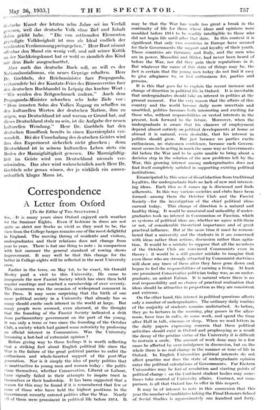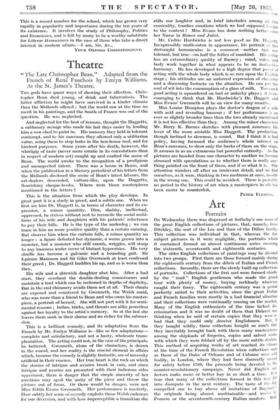Correspondence
A Letter from Oxford
[To the Editor of THE SPECTATOR.] is many years since Oxford enjoyed such weather for the Sunimer Eights. Even if fashions in dress are not quite so strict nor frocks as vivid as they used to be, the view from the College barges remains one of the most delightful in England. The moving throng of residents and visitors, undergraduates and their relations does not change from year to year. There is but one thing to note : in comparison with last summer the general standard of rowing shows improvement. It may well be that this change for the better in College eights will be reflected in the next University crew.
Earlier in the term, on May 1st, to be exact, Sir Oswald Mosley paid a visit to this University. He came to inaugurate the new Fa4cist Society which has since then held regular meetings and reached a membership of over seventy. This occurrence was the occasion of widespread comment in the Press. It may seem surprising that the birth of one more political society in a University that already has so many should excite such interest in the world at large. But many people were aroused, even alarmed, at the thought that the founding of the Fascist Society indicated a drift from parliamentary government on the part of the young. It was only a term or two since the founding of the October Club, a society which had gained some notoriety by professing an official interest in Communism. Was the University becoming a hot-bed of extremist opinion ?
Before giving way to these feelings it is worth reflecting that a striking fact about English political life since the War is the failure of the great political parties to enlist the enthusiasm and whole-hearted support of the post-War generation. Nor- is it simply the idea of party politics that is unattractive to young men and women today : the politi- cians themselves, whether Conservative, Liberal or Labour, have signally failed in their attempts to inspire trust in themselves or their leadership. It has been suggested that a reason for this may be found if it is remembered that few or none of those who have held the highest positions in the Government recently entered polities after the War. Nearly all of them were-prominent in political life before 1914. it
may be that the NVar has made too great a break in the continuity of life for those whose ideas and opinions were moulded before 1914 to be readily intelligible to those who did not begin life until after that date. In this context it is significant that only two countries in Europe have secured for their Governments the support and loyalty of their youth. Those countries are Germany and Italy, and the men who are in power, Mussolini and Hitler, had never been heard of before the War, nor did they gain their reputations in it. But whatever the cause of this state of things may be, the fact is certain that the young men today do not find it easy to give allegiance to, or feel enthusiasm for, parties and persons.
It is this that goes far to explain the recent increase and change of direction in political life in Oxford. It is inevitable that undergraduates should take an interest in politics at the present moment. For the very reason that the affairs of this country and the world become daily more uncertain and unsettled, polities becomes both interesting and exciting for those who, without responsibilities or vested interests in the present, look forward to the future. Moreover, when the Undergraduate is aware that his chances of employment depend almost entirely on political developments at home or abroad it is natural, even desirable, that his interest in politics should grow. But just because no parties excite enthusiasm, no statesmen confidence, because each Govern- ment seems to be acting in much the same way as Governments did before the War and to be quite unable to bring about a decisive step in the solution of the new problems left by the War, this growing interest among undergraduates does not find itself completely satisfied in supporting existing political institutions.
Emancipated by this sense of dissatisfaction from traditional loyalties, the undergraduate finds no lack of new and interest- ing ideas. Each idea as it conies up is discussed and finds adherents. In this way various societies and clubs have been formed—among them the October Club and the Fascist Society—for the investigation of the chief political ideas current today. This change of direction is a natural and healthy thing. It would be unnatural and unhealthy if under- graduates took no interest in Communism or Fascism, which as systems of political ideas are. whether we agree with them or not, of considerable theoretical importance and of great practical influence. But at the same time it must be remem- bered that a university and the students in it are concerned with ideas rather than actions, discussion rather than agita- tion. It would be a mistake to suppose that all the members of the OctOber Club are convinced Communists even in theory : it would be a still greater mistake to imagine that even those who are strongly attracted by Communist doctrines will show any trace of them after they have gone down and begun to feel the responsibilities of earning a living. At least one prominent Conservative politician today was, as an under- graduate, an ardent Fabian. It is natural where there is no real responsibility and no chance of practical realization that ideas should be attractive in proportion as they are consistent and extreme.
On the other hand, this interest in political questions affects only a number of undergraduates. The ordinary daily routine of the majority of students remains undisturbed. As before, they go to lectures in the morning, play games in the after- - noon, have teas in cafes, do some work, and spend the time after Hall in talk, cinemas or sleep. When we read letters in the daily papers expressing concern that these political activities should exist in Oxford and prophesying as a result the decay of the pristine virtue of the University it is difficult to restrain a smile. The amount of work done may in a few cases be affected by over-indulgence in discussion, but on the whole there is no real change in the manner or tone of life in Oxford: In English Universities political interests do not affect practice nor does the state of undergraduate opinion enter the political calculations of Governments. Far Eastern Universities may be foci of revolution and starting points of political change : on the Continent student bodies may some- times take control of University affairs. Contrast, not com- parison, is all that Oxford has to offer in this respect.
It may be of interest to note in this connexion that this year the number of candidates taking the Final Honours School of Social Studies is approximately one hundred and forty.
This is a record number for the school, which has grown very rapidly in popularity and importance during the ten years of its existence. It involves the study of Philosophy, Politics and Economics, and is felt by many to be a worthy substitute for Litterae Ilurnaniores in the case of those who take a direct interest in modern affairs.—I am, Sir, &c.,
YOUR OXFORD CORRESPONDENT.

















































 Previous page
Previous page